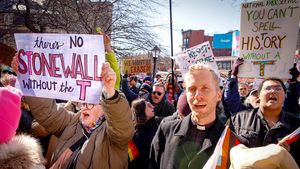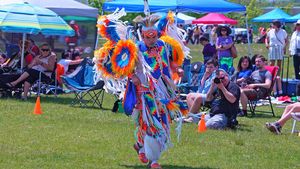Diana Tourjee isn't afraid to get into the thick of it. Since starting her career as a journalist, the writer and advocate has created a name for herself as she dives deep into the lives of transgender Americans facing everything from battles for the right to use the correct school bathroom to election night face-offs.
Since joining Vice's Broadly channel, Tourjee has created compelling videos focused around topics that lie at the heart of the fight for transgender rights in America and, with these videos, she's provided a lifeline to the community as the Trump administration wreaks havoc on basic human rights.
Related | These Transgender Women Made Election Night History
It's all part of the job for her as she continues her award-winning advocacy work. This past weekend, Tourjee won GLAAD's Outstanding Digital Journalism award for "This is How We Win: Inside Danica Roem's Historic Victory," a documentary that went inside the incredible election night victory of the transgender politician's ascent to the Virginia House of Delegates.
While Tourjee celebrates her win and takes a break from her book on Flawless Sabrina's investigation into the 1973 Houston Mass Murders, we caught up with the journalist to talk about her GLAAD award, how cisgender people can report on trans issues responsibly, and why she doesn't care about being pigeonholed into covering trans issues.
OUT: You've just won a GLAAD award for your work on the documentary about Danica Roem's historic election to the Virginia House of Delegates. How does it feel to be recognized for your work on this?
Diana Tourjee: Its an honor to have my work recognized by GLAAD. I had written about Danica, so I was loosely familiar with her, so when she was in New York, she met with us. She'd been approached by a lot of media outlets and had turned them down, but we were able to convince her to let us be a fly on the wall in the 48 hours leading up to election night. It was really unclear whether she was going to win or not and I was fortunate to witness the election in real time. When she won, it was such a profound moment. I think it signaled a great moment of political progress in this country.
As a high-school dropout who has struggled to get my footing in life, it's really humbling to find that I can produce work that is meaningful to other people and important in today's cultural climate. It would not have been possible to create this piece on Roem without the foresight of my producer, Erica Matson, who landed the story and predicted it would be important to document, or the crew of people who supported the production and made it come to life. Winning this award is deeply affirming, and I feel grateful to share the stories of incredible people like Danica Roem. I believe now more than ever that storytelling can change the world, and I am moved by the notion that a story we tell at Broadly could help a viewer or reader somewhere in the world.
Do you have any plans for work focused around the 2018 midterm elections?
Right now I am focusing on telling stories about people who are doing incredible things in their lives and in their communities, whether political or personal. It is hard to predict upcoming coverage, but I am dedicated to covering stories that touch the lives of underrepresented Americans, and there's no lack of want for such stories today.
A lot of publications are attempting to focus on issues facing the transgender community. While that's good, why is it important to also have transgender people reporting on these issues as well?
I started writing when I started my transition and that was largely because I had been lost in my personal life for a long time -- writing became a very cathartic experience for me. I wrote about gender and things like that because it was something that I was going through and had suffered through within my life, so it made sense for me to blog about that.
Over time, I felt drawn to weigh in on current events and political issues that I had seen and issues that totally shaped my experience as a young person. Realizing that [these issues] shaped my experience as a person and as a journalist, I've chosen to keep my perception pointed outward rather than inward. At the same time, feel it's deeply personal. The issues that I'm writing about and covering were personally important to me, but I choose to tell other people's stories as a way to shine light on what's happening beyond me.
I definitely didn't set out to be a trans journalist covering trans issues, but I ended up there. I don't have to just write exclusively about trans topics and I do cover other issues, but there came a time in my career that I didn't care about being pigeonholed into covering trans issues. I'm deeply interested in addressing these topics of gender and sexuality that impact and affect and structure all of our experiences in the United States -- whether we're trans or not.
How can cisgender writers and reporters report on trans issues responsibly?
I think that anyone that's writing about trans issues needs to have some basic understanding of where leaders and society are at in terms of what trans identity means. They need to understand how the American Medical Association feels about transgender issues. How the American Psychiatric Association feels. How trans people been historically treated in employment and housing or what the various ways that trans people have experienced marginalization, depression, and discrimination are. Consider the full scope of the history of the trans population and where it's at today so that when you're engaging with it, you're not doing it from a place of ignorance.
A lot of the time, trans subjects are put off by journalists who aren't enmeshed in some way within the community because it's possible for someone's identity to be reduced to whatever body modifications they might've undergone or they stereotype them in some way. If they're telling a story about a trans person that deals with trans subject matters, they're going to be talking about what it means to be trans and what trans people go through. You have to be able to do that in a way that puts trans people on the same level with the rest of society, so that they're not being described as an outlier or spectacles. Their identity is not all they are, but it's important to find a way to not disregard the significance of that identity while also moving beyond the package in which trans issues are often delivered.
People are still learning, obviously, and because there's such a great level of resistance even among journalists who follow trans issues, or even taking it at face value, we're still at a place where they're up for debate to some degree. That is a critical point in journalism around trans issues that needs to be surmounted, but won't be until people regard transgender people as fully human and deserving of the human rights that they're entitled to based on their own self-identification, as well as the recognition from society that this population is real and has real needs.
This is why it can be very shocking when social leaders or presidential administrations change. One leader can set the groundwork for trans people to be perceived as the same as other Americans, and then another starts rolling things back, and causes people to question whether or not trans people are necessarily entitled to basic rights. We really haven't reached the point in society where people recognize that it's not really appropriate to debate the humanity of either your classmates or members of your society, and whether or not those people are entitled to freedom and liberation and civil rights. Trans people remain up for debate, unfortunately.
How have you dealt with life in America since the election?
Traumatically. Under the Obama administration, so much progress was made for transgender people in the United States, so when Trump actually won, it was very difficult to figure out how we were going to move forward. I think my work as a journalist has saved me in that regard because it allows me to focus on doing work that can help expand the public's understanding of portions of the community who have been further marginalized under the Trump administration.
Photography by Alyza Enriquez

























































































